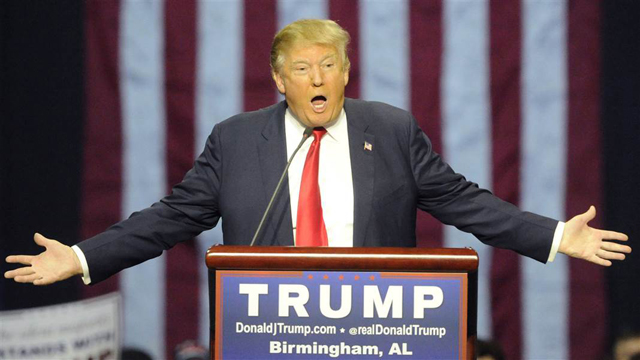An educated, informed electorate is an essential bulwark of democracy.

Would I lie to you? The real Donald Trump on the campaign trail. PHOTO NBC News
People want things to be simpler, said voters in three big electoral events last year – Malcolm Turnbull’s narrow squeak, the Brexit plebiscite and the US presidential election.
Complexity almost defines modern life, and it can drive you batty. Any promise to sweep it all away seems very welcome. That’s how Pauline Hanson returned to parliament, how Britain found itself out of Europe, and how Donald Trump became the most powerful person in the world.
Simple slogans got these causes over the line. But reality isn’t simple. Voters must understand that complexity if they want good outcomes.
Of all the many possible reasons for choosing a government – creating jobs, keeping us safe, balancing a budget, caring for the vulnerable and so on – one reason stands way out on its own: education. In its impact on our lives and its value for the country, nothing else comes close.
I’ve been lucky. My parents weren’t wealthy, but I enjoyed well-funded, high-quality state schooling – the product of generations of struggle for universal secular education. For that I’m eternally grateful, because education is a lifelong pursuit with boundless reward.
Learning makes you happy. You see that in the faces of schoolchildren in parts of the world where schools may be just a teacher and where schooling can be hazardous. I saw and felt that pleasure during a stint as a volunteer tutor for adult learners, including refugees.
A good education teaches you about change over long periods of time – things that have evolved over hundreds, thousands or millions of years. You learn the value of slowly evolving institutions and procedures, like parliaments, courts, the rule of law, due process.
Through history I discovered the wisdom of ancient sages, and how modern science’s method of formulating and testing questions has expanded that early knowledge thousands of times over.
You discover through learning that however much you know, there’s infinitely more out there that you don’t know. You learn that like all life on this planet, human society is complex. But woven through it all are patterns, which we can use to manage that complexity.
Finding patterns and pathways in the maze of human affairs is hard. People in charge need to be smart enough to do that, and to know that solving social and political problems is never neat and simple. As any effective education will tell you.
Good government also needs effective news media. As a cadet journalist I was taught that my profession was as important as medicine and the law because it was people’s main means of separating fact from fiction in daily public life.
Good journalism must get to the truth of the matter, and that demands skill, experience, restraint and education. And objectivity. Like a court, a good journalist doesn’t rely on hearsay or gossip – the reason why online social media cannot be a complete news service.
“Elite” is a word with a lot of currency. “Political elites” of politicians and staffers cut off from the outside world are a genuine concern. The catchcry of the Brexit, Hanson and Trump campaigns – that a “cultural elite” of educated people is destroying the lives of ordinary people – is not.
While doing nothing for inequality, this cynical ploy ensures the public is denied the truth, and without truth democracy will fail. That’s why I find the rise of the first “post-truth” US president, for whom complex reality is a nuisance to be ignored or brushed aside, such a scary proposition.
• INFORMING us about climate is the focus of two events at IMAS (Princes Wharf, Hobart) this week: a lecture by Eelco Rohling, ANU professor of ocean and climate change, at 6 pm tonight; and an interpretation of dangerous climate change by musician Simon Kerr and Melbourne University law professor Christine Parker on Thursday at 1pm.
Kerr’s and Parker’s Music for a Warming World will travel to Clarence Uniting Church (York St, Bellerive, 7.30pm Friday), Brookfield Margate (1640 Channel Highway, Margate, 7.30pm Saturday), and Moonah Arts Centre (23 Albert Road, Moonah, 3 pm Sunday).
